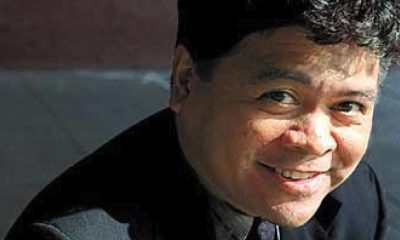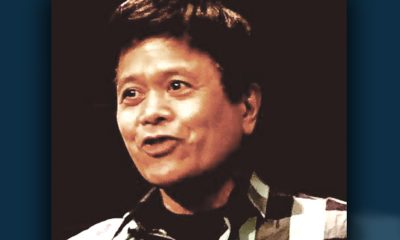Op-Ed
Beyond the Rhetoric: Apple’s Unreasonable Patent Claim
By Harry C. Alford
NNPA Columnist
In December, the U.S. Court of Appeals for the Federal Circuit heard arguments in the long- running patent war between Apple Inc. and Samsung Electronics Co. Ltd. over claims that the South Korean tech firm infringed upon Apple’s design patents. While that case has been broadly discussed, there is another case with the same parties that has garnered less attention but could have severe consequences. This time, Apple is claiming loss of market share and injury to its “reputation for innovation” – all because of Samsung’s alleged infringements.
For consumers, and particularly minorities, this case raises important questions of business competition, innovation, and social justice. That’s why the National Black Chamber of Commerce (NBCC) recently filed a brief in support of Samsung’s position. Patents serve a very useful purpose for protecting companies that innovate and invest in new technologies and products. But care should be taken to prevent a company from using its self-proclaimed “reputation for innovation” to “leverage” its patents for competitive gain far beyond what the intrinsic value of the patent warrants.
The dispute at hand concerns three utility patents held by Apple: 1) recognizing certain patterns in data such as phone numbers and email addresses and linking them to actions such as touch to dial; 2) “slide-to-unlock” to prevent accidental activation; and 3) automatically correcting spelling errors on the touchscreen. The courts awarded Apple $119 million plus supplemental damages for any future violations, and Apple sought a permanent injunction to bar Samsung entirely from using features of Samsung’s products found to infringe.
Injunction claims, as Apple is asserting, have traditionally been applied where reputational harm was caused by consumer confusion over a product. Apple claims that it will suffer irreparable harm if its patented features are included in the “products of a less prestigious competitor” – a reason in itself for skepticism of the accusing brand’s intentions. NBCC thinks it is fair to state that consumers rarely, if ever, confuse Samsung and Apple devices, and would certainly not mistake them based on the three features in question.
That leads us to the court stating that in order to “satisfy the irreparable harm factor in a patent infringement suit,” a patentee must establish a strong causal nexus between the irreparable harm and alleged infringement. The lower court rightfully rejected Apple’s argument that the mere potential for harm to its “reputation as an innovator” does not justify injunction against Samsung.
The causal nexus requirement should not be relaxed or much less abandoned simply because the patentee wishes to enjoin alleged infringing features rather than the entire products. In Apple’s case, there is no sufficient proof that the company’s reputation is being harmed because of Samsung’s alleged infringement on the particular patents in question. If the features are as minor as to not even drive demand for the products at issue, then there is absolutely no reason to suggest that these isolated features are so powerful as to harm Apple’s very reputation as an institution.
If Apple gets its way, industry leaders claiming the need to protect their own reputations would be able to force less-established competitors out of the market. This is particularly impactful to small and minority-owned businesses that already have lesser influence in the marketplace. The harm, if any, that high profile companies like Apple are suffering is from their competitors’ legitimate, non-infringing competition or outside sources all together.
Apple’s patents are meant to serve as only a small part of its own complex, multi-feature devices. When Samsung and other developers build products to compete, their devices will inevitably have many similarities. It is reasonably expected that new ideas are built upon existing frameworks. The addition of a few alleged infringements on a feature will not drive consumer’s assumptions about the innovativeness of the companies whose products they buy, and are therefore unlikely to lead to catastrophically harmful effects on a patentee’s reputation. But these types of injunction claims can cause damage to companies, especially smaller ones without a global reputation and capital to support lengthy legal disputes.
Many of the Black-owned businesses NBCC represents own patents, and many compete for business against others that own patents. Blacks today own only 5.5 percent of all American businesses and an even smaller – 4 percent – of high-tech businesses.
Black-owned businesses therefore rely on open competition in the technology sector, including the ability to at least compete on a level playing field with their more-established, better funded, patent-wielding rivals, in order to overcome these historic disparities.
The National Black Chamber of Commerce is concerned that industry leaders like Apple will misuse their patents, and their claims of needing to protect their reputations for “innovation,” to prohibit legitimate competition from less-established minority owned businesses. That’s bad not only for minority inclusion and our communities, but American business competitiveness overall.
Harry C. Alford is the co-founder, President/CEO of the National Black Chamber of Commerce. Website: www.nationalbcc.org Email: halford@nationalbcc.org.
###
Advice
COMMENTARY: If You Don’t Want Your ‘Black Card’ Revoked, Watch What You Bring to Holiday Dinners
From Thanksgiving to Christmas to New Year’s Day, whether it’s the dining room table or the bid whist (Spades? Uno, anyone?) table, your card may be in danger.

By Wanda Ravernell
Post Staff
From the fourth week of November to the first week in January, if you are of African descent, but particularly African American, certain violations of cultural etiquette will get your ‘Black card’ revoked.
From Thanksgiving to Christmas to New Year’s Day, whether it’s the dining room table or the bid whist (Spades? Uno, anyone?) table, your card may be in danger.
It could take until Super Bowl Sunday for reinstatement.
I don’t know much about the card table, but for years I was on probation by the ‘Aunties,’ the givers and takers of Black cards.
How I Got into Trouble
It was 1970-something and I was influenced by the health food movement that emerged from the hippie era. A vegetarian (which was then considered sacrilegious by most Black people I knew) prepared me a simple meal: grated cheese over steamed broccoli, lentils, and brown rice.
I introduced the broccoli dish at the Friday night supper with my aunt and grandfather. She pronounced the bright green broccoli undone, but she ate it. (I did not, of course, try brown rice on them.)
I knew that I would be allowed back in the kitchen when she attempted the dish, but the broccoli had been cooked to death. (Y’all remember when ALL vegetables, not just greens, were cooked to mush?)
My Black card, which had been revoked was then reattained because they ate what I prepared and imitated it.
Over the decades, various transgressions have become normalized. I remember when having a smoked turkey neck instead of a ham hock in collard greens was greeted with mumblings and murmurings at both the dining room and card tables. Then came vegan versions with just olive oil (What? No Crisco? No bacon, at least?) and garlic. And now my husband stir fries his collards in a wok.
But No Matter How Things Have Changed…
At holiday meals, there are assigned tasks. Uncle Jack chopped raw onions when needed. Uncle Buddy made the fruit salad for Easter. My mother brought the greens in winter, macaroni salad in summer. Aunt Deanie did the macaroni and cheese, and the great aunts, my deceased grandmother’s sisters, oversaw the preparation of the roast beef, turkey, and ham. My father, if he were present, did the carving.
These designations/assignments were binding agreements that could stand up in a court of law. Do not violate the law of assignments by bringing some other version of a tried-and-true dish, even if you call it a new ‘cheese and noodle item’ to ‘try out.’ The auntie lawgivers know what you are trying to do. It’s called a menu coup d’état, and they are not having it.
The time for experiments is in your own home: your spouse and kids are the Guinea pigs.
My mother’s variation of a classic that I detested from that Sunday to the present was adding crushed pineapple to mashed sweet potatoes. A relative stops by, tries it, and then it can be introduced as an add-on to the standard holiday menu.
My Aunt Vivian’s concoctions from Good Housekeeping or Ladies’ Home Journal magazine also made it to the Black people’s tables all over the country in the form of a green bean casserole.
What Not to Do and How Did It Cross Your Mind?
People are, of all things holy, preparing mac ‘n’ cheese with so much sugar it tastes like custard with noodles in it.
Also showing up in the wrong places: raisins. Raisins have been reported in the stuffing (makes no sense unless it’s in a ‘sweet meats’ dish), in a pan of corn bread, and – heresy in the Black kitchen – the MAC ‘n’ CHEESE.
These are not mere allegations: There is photographic evidence of these Black card violations, but I don’t want to defame witnesses who remained present at the scene of the crimes.
The cook – bless his/her heart – was probably well-meaning, if ignorant. Maybe they got the idea from a social media influencer, much like Aunt Viv got recipes from magazines.
Thankfully, a long-winded blessing of the food at the table can give the wary attendee time to locate the oddity’s place on the table and plan accordingly.
But who knows? Innovation always prevails, for, as the old folks say, ‘waste makes want.’ What if the leftovers were cut up, dipped in breadcrumbs and deep fried? The next day, that dish might make it to the TV tray by the card table.
An older cousin – on her way to being an Auntie – in her bonnet, leggings, T-shirt, and bunny slippers and too tired to object, might try it and like it….
And if she ‘rubs your head’ after eating it, the new dish might be a winner and (Whew!) everybody, thanks God, keeps their Black cards.
Until the next time.
Alameda County
Seth Curry Makes Impressive Debut with the Golden State Warriors
Seth looked comfortable in his new uniform, seamlessly fitting into the Warriors’ offensive and defensive system. He finished the night with an impressive 14 points, becoming one of the team’s top scorers for the game. Seth’s points came in a variety of ways – floaters, spot-up three-pointers, mid-range jumpers, and a handful of aggressive drives that kept the Oklahoma City Thunder defense on its heels.

By Y’Anad Burrell
Tuesday night was anything but ordinary for fans in San Francisco as Seth Curry made his highly anticipated debut as a new member of the Golden State Warriors. Seth didn’t disappoint, delivering a performance that not only showcased his scoring ability but also demonstrated his added value to the team.
At 35, the 12-year NBA veteran on Monday signed a contract to play with the Warriors for the rest of the season.
Seth looked comfortable in his new uniform, seamlessly fitting into the Warriors’ offensive and defensive system. He finished the night with an impressive 14 points, becoming one of the team’s top scorers for the game. Seth’s points came in a variety of ways – floaters, spot-up three-pointers, mid-range jumpers, and a handful of aggressive drives that kept the Oklahoma City Thunder defense on its heels.
One of the most memorable moments of the evening came before Seth even scored his first points. As he checked into the game, the Chase Center erupted into applause, with fans rising to their feet to give the newest Warrior a standing ovation.
The crowd’s reaction was a testament not only to Seth’s reputation as a sharpshooter but also to the excitement he brings to the Warriors. It was clear that fans quickly embraced Seth as one of their own, eager to see what he could bring to the team’s championship aspirations.
Warriors’ superstar Steph Curry – Seth’s brother – did not play due to an injury. One could only imagine what it would be like if the Curry brothers were on the court together. Magic in the making.
Seth’s debut proved to be a turning point for the Warriors. Not only did he contribute on the scoreboard, but he also brought a sense of confidence and composure to the floor.
While their loss last night, OKC 124 – GSW 112, Seth’s impact was a game-changer and there’s more yet to come. Beyond statistics, it was clear that Seth’s presence elevated the team’s performance, giving the Warriors a new force as they look to make a deep playoff run.
Activism
Essay: Intentional Self Care and Community Connections Can Improve Our Wellbeing
At the deepest and also most expansive level of reality, we are all part of the same being, our bodies made from the minerals of the earth, our spirits infused by the spiritual breath that animates the universe. Willingness to move more deeply into fear and pain is the first step toward moving into a larger consciousness. Willingness to move beyond the delusion of our separateness can show us new ways of working and living together.

By Dr. Lorraine Bonner, Special to California Black Media Partners
I went to a medical school that was steeped in the principles of classical Western medicine. However, I also learned mindfulness meditation during that time, which opened me to the multifaceted relationship between illnesses and the interconnecting environmental, mental and emotional realities that can impact an individual’s health.
Therefore, when I began to practice medicine, I also pursued training in hypnosis, relaxation techniques, meditation, and guided imagery, to bring a mind-body focus to my work in medical care and prevention.
The people I saw in my practice had a mix of problems, including high blood pressure, diabetes, and a variety of pain issues. I taught almost everyone relaxation breathing and made some general relaxation tapes. To anyone willing, I offered guided imagery.
“My work embraced an approach to wellness I call “Liberatory Health” — one that not only addresses the treatment and management of disease symptoms but also seeks to dismantle the conditions that make people sick in the first place.”
From my perspective, illness is only the outermost manifestation of our efforts to cope, often fueled by addictions such as sugar, tobacco, or alcohol, shackled by an individualistic cult belief that we have only ourselves to blame for our suffering.
At the deepest and also most expansive level of reality, we are all part of the same being, our bodies made from the minerals of the earth, our spirits infused by the spiritual breath that animates the universe. Willingness to move more deeply into fear and pain is the first step toward moving into a larger consciousness. Willingness to move beyond the delusion of our separateness can show us new ways of working and living together.
To put these ideas into practical form, I would quote the immortal Mr. Rogers: “Find the helpers.” There are already people in every community working for liberation. Some of them are running for office, others are giving food to those who need it. Some are volunteering in schools, libraries or hospitals. Some are studying liberation movements, or are working in urban or community gardens, or learning to practice restorative and transformative justice, or creating liberation art, music, dance, theater or writing. Some are mentoring high schoolers or apprenticing young people in a trade. There are many places where compassionate humans are finding other humans and working together for a better world.
A more compassionate world is possible, one in which we will all enjoy better health. Creating it will make us healthier, too.
In community, we are strong. Recognizing denial and overcoming the fragmenting effects of spiritual disorder offer us a path to liberation and true health.
Good health and well-being are the collective rights of all people!
About the Author
Dr. Lorraine Bonner is a retired physician. She is also a sculptor who works in clay, exploring issues of trust, trustworthiness and exploitation, as well as visions of a better world.
-

 Activism4 weeks ago
Activism4 weeks agoIN MEMORIAM: William ‘Bill’ Patterson, 94
-

 Activism3 weeks ago
Activism3 weeks agoOakland Post: Week of November 19 – 25, 2025
-

 #NNPA BlackPress3 weeks ago
#NNPA BlackPress3 weeks agoBeyoncé and Jay-Z make rare public appearance with Lewis Hamilton at Las Vegas Grand Prix
-

 #NNPA BlackPress4 weeks ago
#NNPA BlackPress4 weeks agoLewis Hamilton set to start LAST in Saturday Night’s Las Vegas Grand Prix
-

 #NNPA BlackPress2 weeks ago
#NNPA BlackPress2 weeks agoLIHEAP Funds Released After Weeks of Delay as States and the District Rush to Protect Households from the Cold
-

 Alameda County2 weeks ago
Alameda County2 weeks agoSeth Curry Makes Impressive Debut with the Golden State Warriors
-

 Activism3 weeks ago
Activism3 weeks agoOakland Post: Week of November 26 – December 2, 2025
-

 #NNPA BlackPress2 weeks ago
#NNPA BlackPress2 weeks agoSeven Steps to Help Your Child Build Meaningful Connections





















































